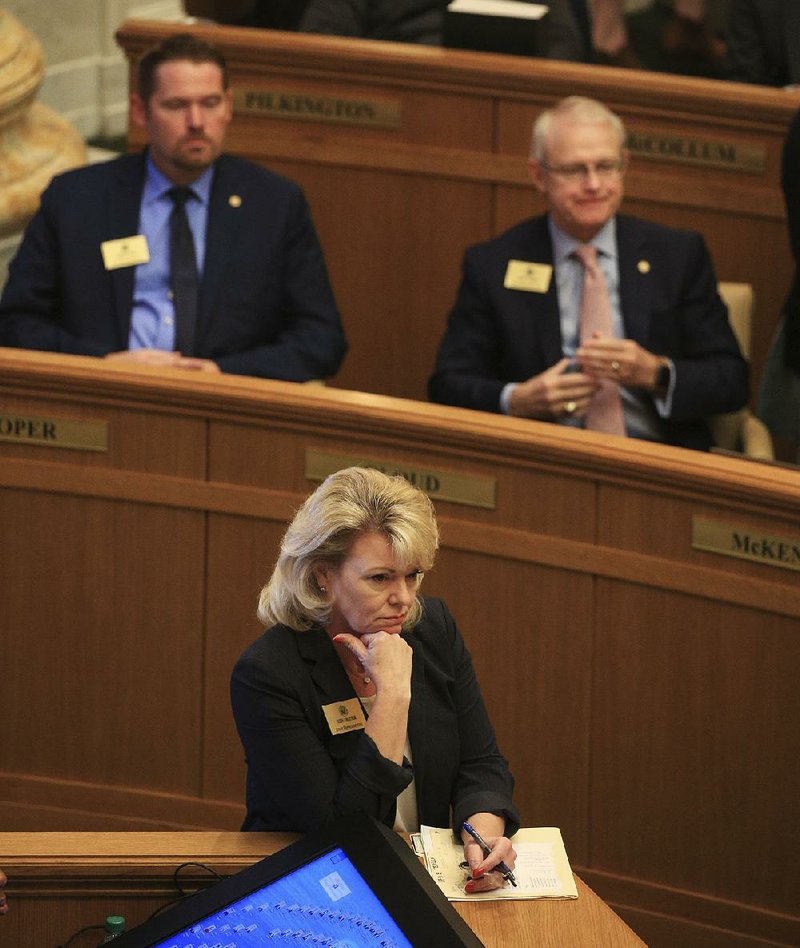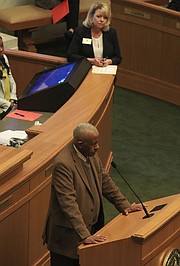Two bills that would reduce the reach of Arkansas' new voter-approved minimum-wage law failed to gain traction Monday in the state House of Representatives, where lawmakers overwhelmingly rejected exemptions for teenagers and hourly employees of small businesses and nonprofit groups.
The sponsor of both bills, Rep. Robin Lundstrum, R-Elm Springs, told the House that the wage increase approved by voters last November came with "unintended consequences" that lawmakers needed to remedy.
Voters approved raising the state minimum wage from $8.50 to $9.25 per hour, effective Jan. 1. The wage will rise to $10 an hour in 2020 and $11 an hour in 2021 under the initiated act.
"You're not going to get that [first job] when it goes up to $10, $11," Lundstrum said.
The first piece of legislation she ran Monday, House Bill 1753, would allow teenagers to continue to receive the wage increase this year, but would exempt them from wage increases in 2020 and 2021.
House Bill 1752 also would allow the current wage of $9.25 for workers of some small businesses and nonprofit groups. The bill would eliminate the 2020 and 2021 raises for employees of businesses with fewer than 25 employees; nonprofit groups with an annual budget of less than $1 million; and nonprofit developmental service providers whose operations are primarily funded by state or federal reimbursement or both, on a fee-for-service schedule.
Lundstrum said of HB1752, "Our small businesses are the heart of our small towns, our business corridors. Our nonprofits are our souls."
[RELATED: Complete Democrat-Gazette coverage of the Arkansas Legislature]
In separate votes Monday, the 100-member House rejected both of Lundstrum's proposals. Each bill needed 67 votes to pass because each would have amended an initiated act of the people.
The House rejected HB1753 by a vote of 34 to 42. The second bill dealing with smaller employers and nonprofit groups, HB1752, received even less support, falling by a vote of 29 to 45.
Before running her bills in the House on Monday afternoon, Lundstrum attempted to gather some support from the Legislative Black Caucus at the group's weekly meeting on Monday morning.
Members of the caucus, however, pushed back on Lundstrum's assertions that the popular minimum-wage initiative needed to be rolled back.
"How do you know the consequences are unintended?" asked Sen. Joyce Elliott, D-Little Rock, the caucus chairman.
Rep. John Walker, D-Little Rock, also questioned Lundstrum's assertions at the caucus. Later, on the House floor, he spoke against opting out teenagers from the higher wages.
The voters "overwhelmingly passed the bill to raise the minimum wage. They did not make the exception that is being proposed," Walker said.
The minimum-wage proposal, one of three proposals on the ballot in the November general election, received 605,784 votes for and 279,046 against.
No member of the Legislative Black Caucus nor any Democrats voted for either of Lundstrum's bills. Fewer than half of the Republican majority voted for either bill.
In March, after Lundstrum's bills made it out of committee, Republican Gov. Asa Hutchinson announced in a speech that he opposed making changes to the initiated act.
"I don't think that helped," Lundstrum said Monday of the governor's comments. "That still doesn't answer the question about small businesses and nonprofits. ... Those problems aren't going to go away just because we had a vote today."
Lundstrum said she would not make attempts to revive either bill during the remainder of the ongoing regular session, which is scheduled to recess by the end of next week.
David Couch, the architect of the minimum-wage ballot issue, said he had been surprised by the lopsided vote in the House. Lundstrum's bills, he said, "went down in a blaze of glory."
A group aligned with Couch, Arkansans for a Fair Wage, had run digital ads on Facebook and Twitter over the weekend immediately before the vote, calling out lawmakers who had voted to support the bills in committee. The posts, which Couch said were targeted at people in the lawmakers' districts, featured the names and faces of each lawmaker, along with a warning that "this politician is working against the people of Arkansas."
After the vote on Monday, the group -- using the Twitter name Save AR Wage -- posted a "Hall of Shame" with the names of lawmakers who had voted for Lundstrum's bills in the House.
"Everything that they raised had been raised during the campaign and the people voted on it," Couch said. "To me, it was the consequences people intended."
Lundstrum had also faced criticism from Democrats and advocates of the wage increase for passing her bills through the House Committee on Public Health, Welfare and Labor during meetings that stretched late into the evenings. Lundstrum, who does not serve on the committee, has said she waited in line to present her bills like the rest of her colleagues.
A Section on 04/02/2019

